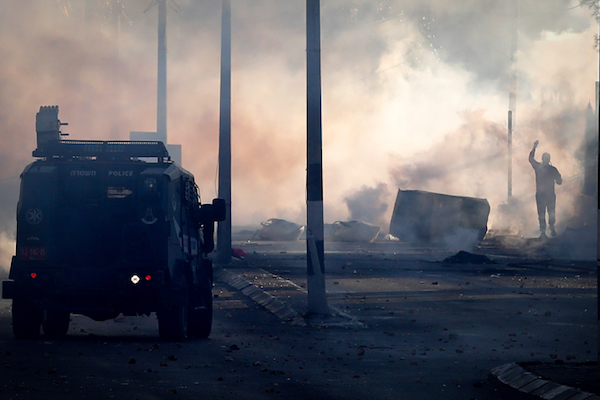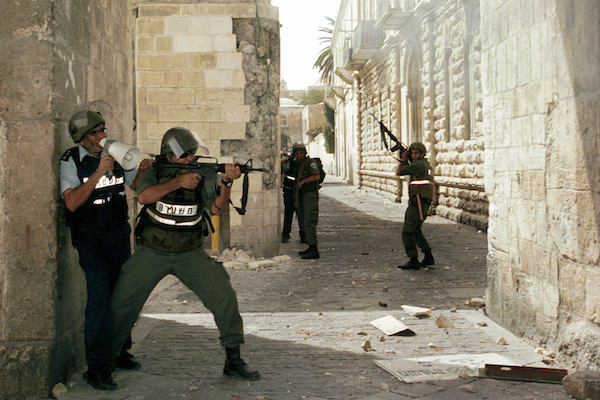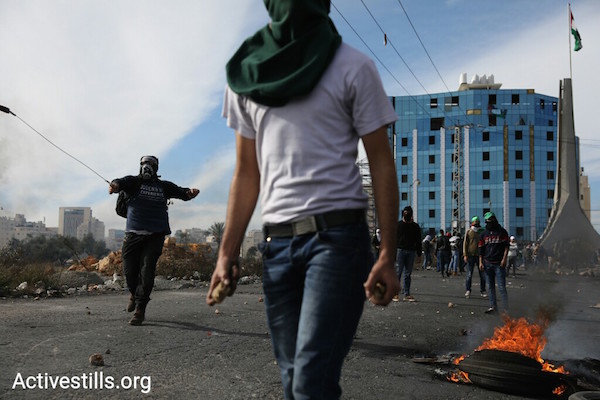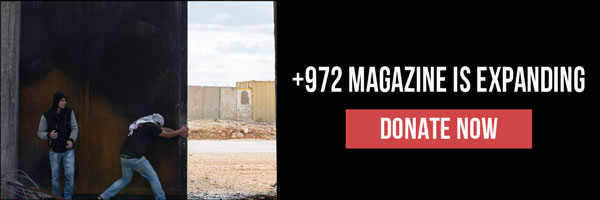We stayed home from school for more than three months. When we returned, more than half of the class was gone. They say children always pay the highest price.
By Zizo Abul Hawa

I was nearly 13 when the Second Intifada started. We were in school when Ariel Sharon visited the Temple Mount. School ended early when the rioting began. The children were told to return home; parents came to pick up their kids. My school was in the center of East Jerusalem, very close to the Old City. My parents were at work and couldn’t pick me up, so I decided to go home alone.
On the way to the central bus station in East Jerusalem, my eyes began to burn and I started tearing up — I didn’t know why. It was the first time I had experienced tear gas. I started to cry and didn’t know what to do. Though I could barely see, what I did see was chaos everywhere: boys and girls leaving school and running, massive traffic jams, and screams in every direction.
I managed to reach my father’s work, which was close to the school. He worked at an electronics store. It was closed, like all of the businesses in the area that shuttered their storefronts due of the riots. I banged on the shutters and yelled “Baba” a few times until one of the other employees opened the store. He told me my father had gone to the school to pick me up, and told me to come inside. I didn’t want to. All I wanted was to be with my father, to feel safe, so I took off again for the school.
When I got to the school, it was already closed and my father wasn’t there. I didn’t know what to do, but I knew that I didn’t want to return to the area of the central station. I told myself that I would try to escape through Wadi al-Joz because it was far from the central station. It wasn’t a short walk, in many ways, but eventually I made it home. My mother was already there. My father and my brothers had gone to look for me. Slowly, one by one, they returned home, and I calmed down. We turned on the news and I thought to myself that surely this is a one-off event — tomorrow, it will all be over. No one could possibly want more of this, despite what I heard all around me: “tomorrow will be even worse, it’s Friday.”
‘And then it all began’

I continued to watch the Sydney Olympics the next morning. There was a “competitive walking” event that I was really into because one of the contestants was a Spanish woman who, suddenly, had a chance. I was excited. There was a surprise in the final moments of the event, and the Spaniard won the bronze medal. I was delighted. In that moment, I thought the whole mess was over, that that was it.
The next morning my father prepared for Friday prayers, and my uncle came to pick him up. My mother asked them where they were going to pray. Al Aqsa, they told her. She asked if maybe they could pray at a closer mosque on the Mount of Olives, because there was a chance that there would be chaos again the old city. “It will be fine. Don’t worry,” my uncle told her. And then it all began. The entire neighborhood was pandemonium. News of casualties at al-Aqsa — wounded and killed — began to come in. My eyes began to burn again, like the day before. My siblings and I were at home but my father had yet to return. As the time ticked by, we became increasingly worried. My mother refused to let us leave the house.
After a few hours, my father and uncle returned, barely breathing, looking half-dead. They told us what we’d already seen on television, that the wounded were being taken to Al-Makassed Hospital (the main Palestinian hospital in East Jerusalem, a five-minute walk from my home), but that the Israeli army had closed down the roads. The main streets were filled with clashes between soldiers and demonstrators—Palestinians throwing stones at the soldiers, and the soldiers shooting at them. Tires and trash cans were on fire.
The army stopped people trying to take the wounded to the hospital. All the entrances to the area were closed. My eyes didn’t stop burning that whole day. We spent the whole day with halved onions to lessen the burning, or at least that’s what we were told would help. I didn’t feel a difference.
I remember feeling bummed out that this all prevented me from watching the end of the Sydney Olympics. I wanted to watch more races; I wanted to see the closing ceremony without anyone disturbing me in the middle. It annoyed me that this all disrupted my day; it was the little, silly things that occupied me.
Nightfall did not bring quiet. Army units patrolled the area. Soldiers knocked on doors, looking for people who they claimed had thrown stones. When I woke up the next day, I heard women in the neighborhood telling my mother that “this person’s son and that person’s son” had been taken from their beds in the middle of the night and arrested. Dozens of children. I thought, perhaps, that this was the end, that I would be able to return to my normal routine. All I wanted to do was watch the closing ceremony of the Olympics.
Half the class was gone

I realized that we weren’t going to school that day (we go to school on Saturdays, our weekends are Friday and Monday). My brothers and my father went for a walk outside and I joined them. When we reached the main street on the Mount of Olives, it looked like an abandoned war zone from the movies. The entire street was covered in bullets and shell-casings, not just rubber-coated bullets. It was impossible to walk without stepping on them. Somehow, this calmed me. It was the calmest things had been over the past two days. It was very early in the morning.
A little later, it all began again. And again. And again. This was the new routine. Each day, it was the same, a kind of ritual: wake up, clean the blood and bullets from the streets, then the riots and fires would start again. Tear gas and burning eyes. Then it would get dark, things would calm down, people would go home, the army would take a few children at night: repeat.
We didn’t return to school until January of 2001. We stayed home for more than three months. When we returned, it wasn’t the same. More than half of the class was gone, schoolchildren, 12- and 13-year-olds like me: some because their families had fled the area, or because they were wounded and in the hospital, or because they were arrested and in jail, or because they were buried deep in the earth. They say children always pay the highest price in war.
The Israeli public talks constantly of “united Jerusalem” but if you live in East Jerusalem and you don’t speak Hebrew, you don’t know much about Israel, and the only interactions you have with Israelis are with the army. Talk of “united Jerusalem” is disconnected from reality. I could tell you endless stories about what I witnessed in the years that followed, but this would demand more time and energy that I’m not sure I have.
This past week marks exactly 30 years since the First Intifada, and 17 since the second. This past Friday, the air was full of rage like it was then. All of this raises memories that I worked hard to suppress, images that I never want to see again. I can only hope, with all my heart, that that there won’t be a third, though I know this hope feels selfish.
Zizo Abul Hawa is a Palestinian journalist. This article first appeared in Hebrew on Local Call. Read it here.

